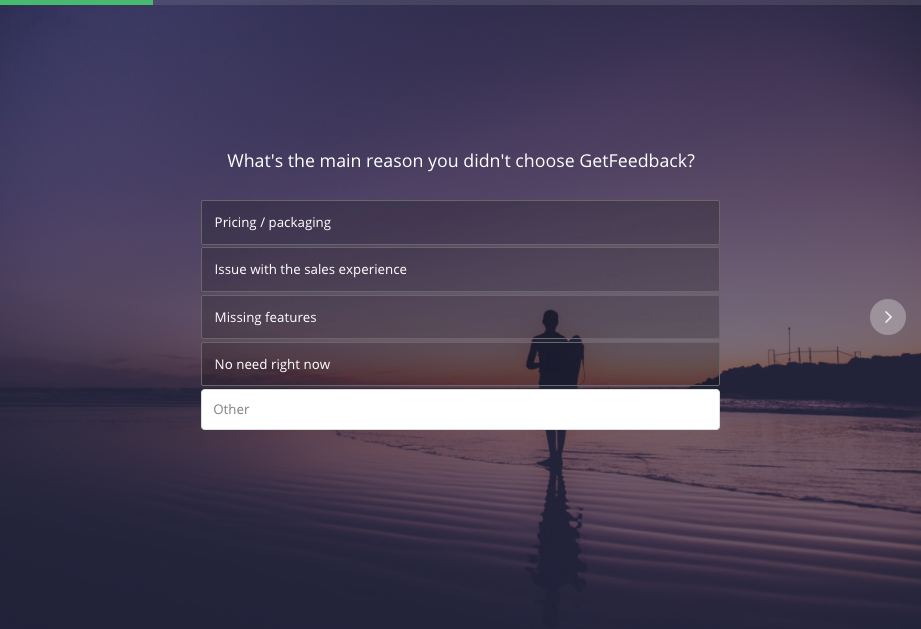I’ll explain how our sales organization uses win-loss surveys to refine our processes and develop our competitive positioning. As a sales rep with a lot of deals to manage, filling in those details for each deal just seemed to take time away from actually selling. Each time a sales rep closed an opportunity, they’d have to fill out these fields. Moreover, our team integrated the survey with Salesforce, so our survey responses would tie back to the opportunity and rep. The sales rep surveys weren’t giving us objective data on why we were winning and losing deals. So, we decided to survey the sales rep and the prospect. We created workflows in Salesforce to automatically send an internal survey to the sales rep and a close-won or close-lost survey to the contact when we closed an opportunity. You can see an example of our close-lost survey here. We also learned that prospect feedback evolves, so running batch surveys once a year doesn’t deliver the kind of insight you need to make real changes in your business. Get feedback from both sales reps and prospects/customers.
Sales is tough. Contrary to popular belief, you can’t schmooze your way to the end of a sales cycle by wining and dining prospects these days.
Training salespeople is tough too. Old notions about how to close don’t always hold up in a modern marketplace. Prospects want transparency and autonomy in their paths to purchase, and it’s up to the salesperson to detect those preferences and deliver.
In fact, Salesforce recently reported that 89% of business buyers expect companies to understand their business needs and expectations. That’s no small feat, especially when most of the contact happens over email or the phone rather than face-to-face.
Plus, salespeople don’t usually get a constant flow of feedback from buyers that they can use to refine their approach. When I lose a deal, I might think: The price was just too high or We had a feature gap. But if the prospect told me honestly, would they list the same reasons?
Asking for feedback seems natural with customer service interactions, but most people are hesitant to collect feedback during the sales process. As a result, most companies focus on measuring service touchpoints only. However, I would argue that sales surveys can tell you just as much about your business and make an impact on it faster.
I’ll explain how our sales organization uses win-loss surveys to refine our processes and develop our competitive positioning.
Why and how we decided to run win-loss surveys
A couple years ago, we were a small organization with a very immature Salesforce instance, and we had an issue with sales reps going “rogue.”
There weren’t too many rules in place for moving through opportunity stages, and though we had a closed-lost field, it was optional. As a sales rep with a lot of deals to manage, filling in those details for each deal just seemed to take time away from actually selling.
We tested a few methods for gathering information, and some worked better than others.
First, we tried adding a bunch of fields in Salesforce for the sales reps to fill out.
Each time a sales rep closed an opportunity, they’d have to fill out these fields. This quickly became a burden, and the extra info cluttered up our Opp detail pages. Plus, to get reliable data, each sales rep would have to fill out the fields by the book (which wasn’t happening).
Next, we tried sending internal surveys to the sales reps.
The survey had a preset number of questions (never more than 5) that we could easily click through and submit. We weren’t hit with a bunch of required fields in Salesforce—things were looking up!
Moreover, our team integrated the survey with Salesforce, so our survey responses would tie back to the opportunity and rep. This meant management could run reports and analyze the data alongside the information in the Opp itself.
While this gave us a lot of great insight, it wasn’t enough. The sales rep surveys weren’t giving us objective data on why we were winning and losing deals. As I mentioned in the intro, my own beliefs about why I lose deals probably don’t align perfectly with what my prospects would say.

COMMENTS